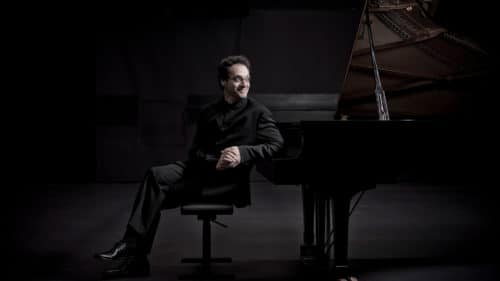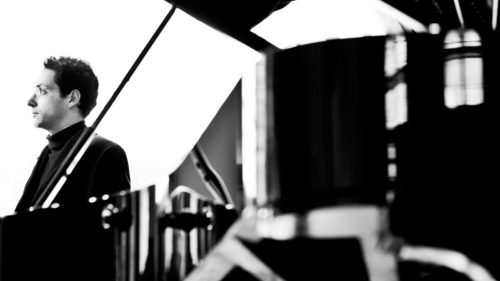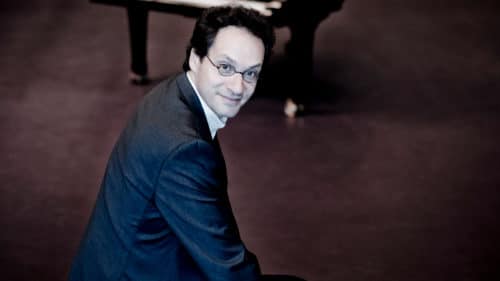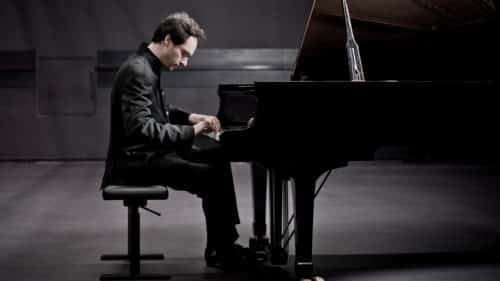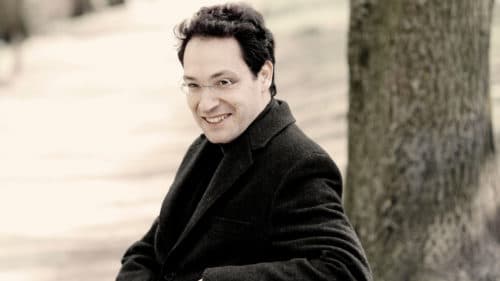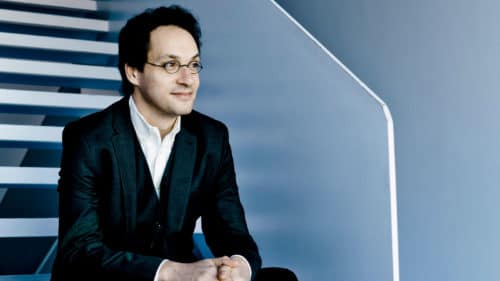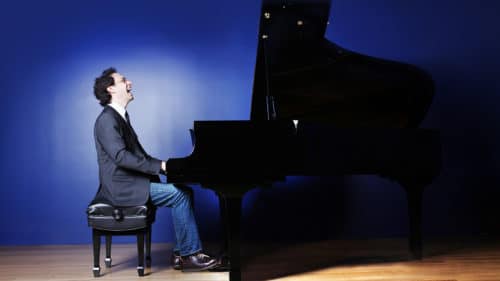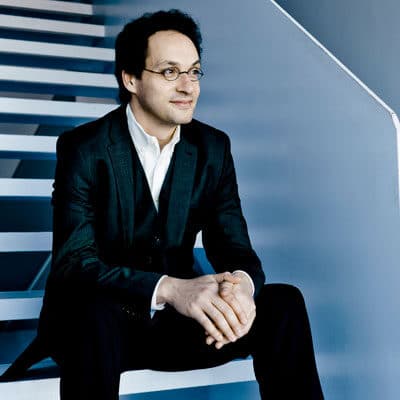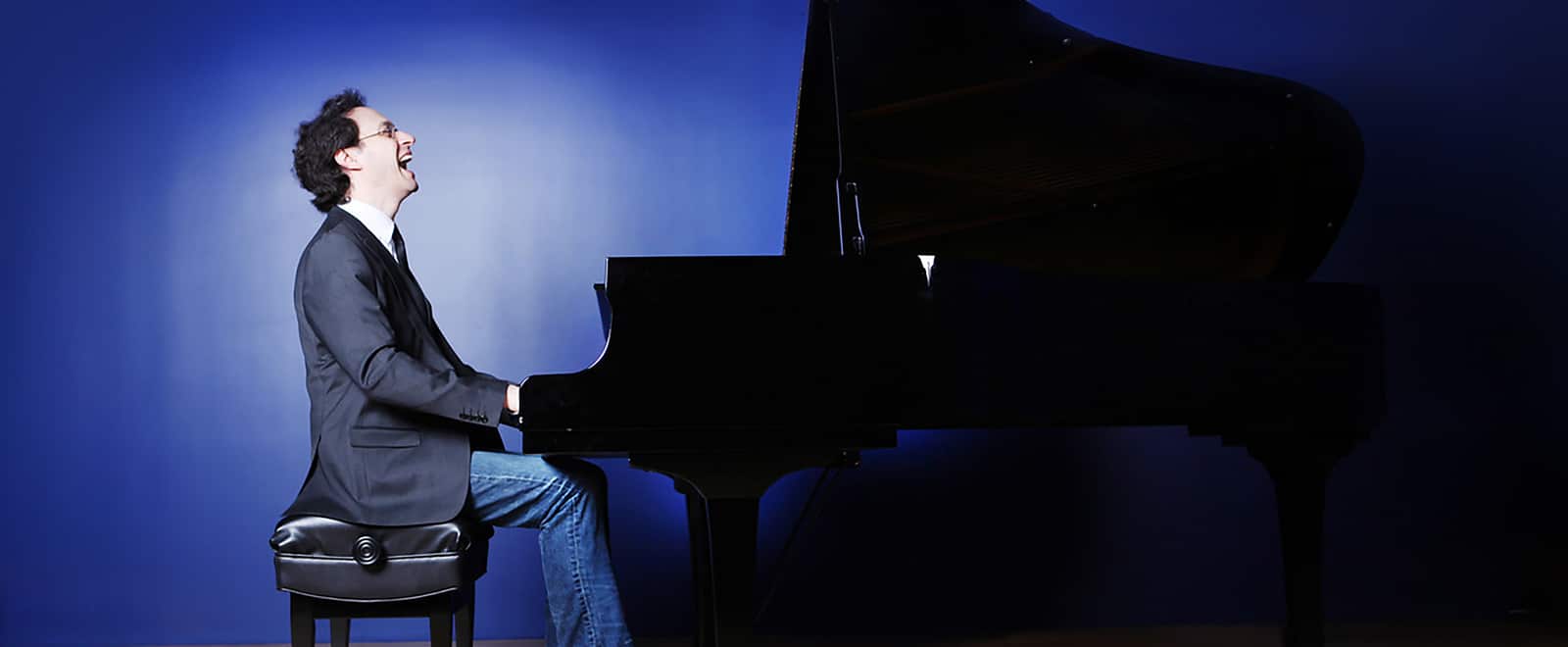
All Things Considered“Decades down the line he will be spoken of as one of the greats.”
The New York Times“[Wosner’s] pianissimos are uncommonly delicate and beautiful. But when the music moves him, his fortissimos can be steely and terrifying.”
San Diego Union-Tribune“…impressive in an elegant, polished performance of the [Mozart No. 20] concerto. Wosner’s playing sounded effortless, and his approach so convincing it seemed inevitable.”
Minneapolis Star Tribune“In Beethoven’s great G-Major Piano Concerto…Shai Wosner was the sometimes delicate, sometimes fiery soloist. The drama of Beethoven’s extraordinary Andante, in which a pleading piano slowly melts an obdurate orchestra, was superbly enacted. Perhaps this humane, edifying music should be played for Minnesota’s political leaders.”
The Arts Fuse“Wosner has lived with these sonatas, and thought them through from every angle, musically and intellectually. The result is revelatory, from the craftily executed quicksilver changes of mood, the sprawling range of dynamic, and the many stunning ways he executes the staccatos. We have, in Wosner’s Schubert, despair intermingled with euphoria, resignation interlaced with fleeting moments of rapture. A heartrending integration of light and dark.”
Chicago Tribune“Wosner…delivered a vivid, perceptive account of Mozart’s Piano Concerto No. 20 in D Minor. His clearly structured opening movement, complete with rippling passage work, mirrored the restless harmonic pull of the orchestral introduction. The Romanza’s serenity, broken by a stormy G-Minor interlude, was beautifully judged as well.”
Bournemouth Echo“Shai Wosner, soloist in Mozart’s Piano Concerto No. 25, proved a shining example of his generation with a sparkling performance that encompassed the difficulties with ease, delighting with the dancing rhythms of the outer movements and affording elegance and serenity within the Andante.”
Pianist Shai Wosner has attracted international recognition for his exceptional artistry, musical integrity, and creative insight. His performances of a broad range of repertoire—from Beethoven and Schubert to Ligeti and the music of today—reflect a degree of virtuosity and intellectual curiosity that has made him a favorite among audiences and critics, who note his “keen musical mind and deep musical soul” (NPR’s All Things Considered).
Highlights of Wosner’s 2024-25 season are a tour of the northeastern United States and Canada with clarinetist Martin Fröst and violist Antoine Tamestit, performing works rooted in folklore and dance in new trio arrangements created by Wosner and Fröst, including Dvořák’s Legends, op. 59, B. 117, nos. 1-3 (arr. Wosner); Brahms’ Clarinet Trio in A Minor, op. 114 (arr. Wosner), Brahms’ Selections from Hungarian Dances, WoO 1 (arr. Fröst), Bizet’s “Tarantelle” from 20 Mélodies (arr. Wosner), and Dance Mosaic: a selection of Swedish, Bulgarian, French, and other folk dance tunes (arr. Fröst & Wosner).
Wosner brings the same musicality, intellect, and sensitivity to his arrangements as he does his piano playing. He has arranged Beethoven’s Symphony Nos. 1, 4 and 6 as trios for cellist Yo-Yo Ma, pianist Emanuel Ax, and violinist Leonidas Kavakos. The latter two arrangements are featured on the trio’s “Beethoven for Three” recordings from Sony Classical. Gramophone wrote of the arrangement of the Sixth Symphony: “The more you explore this arrangement, the more you appreciate the way Wosner respects the original without being hemmed in by it.” This fall, Ma, Kavakos, and Ax perform Wosner’s arrangement of the Sixth Symphony at the BBC Proms, Kulturpalast Dresden, Wiener Musikverein, Elbphilharmonie, and the Philharmonie Luxembourg.
This season, Wosner also performs a recital program of Schubert and David Lang with baritone Benjamin Appl commemorating the centenary of legendary baritone Dietrich Fischer-Dieskau at New York’s Town Hall, presented by the Peoples’ Symphony Concerts (PSC) where Wosner is Artist-in-Residence; a performance with the JACK Quartet on the Music Mondays series in New York, and performances with Chamber Music Society of Lincoln Center. Additionally, he tours Europe with violinist Joshua Bell, and continues to perform as part of the Zukerman Trio with violinist Pinchas Zukerman and cellist Amanda Forsyth.
Wosner recently gave the world premiere of Vijay Iyer’s Piano Concerto Handmade Universe with the East Coast Chamber Orchestra presented by the Peoples’ Symphony Concerts (PSC) in New York, where he is Artist-in-Residence. The concerto, written specifically for Wosner, highlights his commitment to performing works by contemporary composers and his ongoing relationship with Iyer, whose piece, Plinth, Wosner and PSC also commissioned last year as part of the multi-composer suite Variations on a Theme of FDR.
In September 2023, Wosner’s recording of Beethoven’s 33 Variations on a Waltz by Anton Diabelli, Op. 120, was released on Onyx Classics. With this album, Wosner joined the ranks of legendary pianists who have recorded Beethoven’s monumental 33 variations. This recording serves as the companion to Wosner’s 2022 recording for New Focus of the aforementioned Variations on a Theme of FDR. The Diabelli Variations had inspired Wosner to commission five contemporary composers—Derek Bermel, Anthony Cheung, John Harbison, Vijay Iyer, and Wang Lu—to create a work based on a quote from President Franklin Delano Roosevelt’s 1938 address to the Daughters of the American Revolution: “Remember, remember always, that all of us… are descended from immigrants and revolutionists.” Wosner paired Beethoven’s Diabelli Variations with Variations on a Theme of FDR in a recital presented by People’s Symphony Concerts during the 2022-23 season.
Recent recordings from Wosner also include The Air Suspended, on which Wosner performs Christopher Cerrone’s concerto for piano and strings with the Argus Quartet and bassist Pat Swoboda, released on New Focus. In 2020 Wosner released a selection of Schubert piano sonatas continuing his career-long, critically acclaimed engagement with the composer’s music. This double album, released by Onyx Classics, completes Wosner’s recorded series of the composer’s last six sonatas, which he has also performed as a recital series. Additional recordings include Impromptu, comprising improvisationally inspired works by composers from Beethoven and Schubert to Gershwin and Ives; concertos and capriccios by Haydn and Ligeti with the Danish National Symphony conducted by Nicholas Collon; an all-Schubert solo album featuring a selection of the composer’s folk-inspired piano works; solo works by Brahms and Schoenberg; and works by Schubert paired with new works by Missy Mazzoli. As a chamber musician, Wosner has recorded Beethoven’s complete sonatas and variations for cello and piano with Ralph Kirshbaum and—for Cedille Records—works by Bartók, Janáček, and Kurtág with violinist Jennifer Koh.
Wosner is a recipient of Lincoln Center’s Martin E. Segal Award, an Avery Fisher Career Grant, and a Borletti-Buitoni Trust Award—a prize he used to commission Michael Hersch’s concerto Along the Ravines, which he performed with the Seattle Symphony and Deutsche Radio Philharmonie in its world and European premieres. He was in residence with the BBC as a New Generation Artist, during which he appeared frequently with the BBC orchestras, including conducting Mozart concertos from the keyboard with the BBC Scottish Symphony Orchestra. He returned to the BBC Scottish Symphony in both subscription concerts and Proms performances with Donald Runnicles and appeared with the BBC Philharmonic in a live broadcast from Manchester’s Bridgewater Hall. As a concerto soloist in North America, Wosner has appeared with the major orchestras of Atlanta, Baltimore, Berkeley, Chicago, Cleveland, Dallas, Indianapolis, Los Angeles, Milwaukee, Philadelphia, Pittsburgh, Ottawa, San Francisco, St. Louis, and Toronto, among others. In addition to the BBC orchestras, he has performed abroad with the Aurora Orchestra, Barcelona Symphony, Bournemouth Symphony, Frankfurt Radio Symphony, Gothenburg Symphony, LSO St. Luke’s, Nieuw Sinfonietta Amsterdam, Orchestre National de Belgique, Staatskapelle Berlin, and the Vienna Philharmonic, among others. Wosner has also appeared with the Orpheus, St. Paul, and Los Angeles Chamber Orchestras, having conducted the latter from the keyboard in a 2010 concert that was broadcast on American Public Radio. Recently, he toured with ECCO to Memphis, Philadelphia, and New York for the world-premiere performances of Christopher Cerrone’s piano concerto The Air Suspended.
Wosner has worked with such conductors as Daniel Barenboim, Jiří Bělohlávek, James Conlon, Alan Gilbert, Gunther Herbig, James Judd, Zubin Mehta, Peter Oundjian, Donald Runnicles, Leonard Slatkin, Jeffrey Tate, and Yan Pascal Tortelier, and has performed at summer festivals including the Bowdoin International Music Festival, Chautauqua Music Festival, Bravo! Vail festival, Grand Teton Music Festival, Mainly Mozart Festival in San Diego, Mostly Mozart Festival at Lincoln Center, and Ravinia Festival. For several consecutive summers, he was involved in the West-Eastern Divan Workshop led by Barenboim and toured as soloist with the West-Eastern Divan Orchestra.
Widely sought after by colleagues for his versatility and spirit of partnership, Wosner has collaborated as a chamber musician with numerous artists, including Martha Argerich, Martin Fröst, Lynn Harrell, Dietrich Henschel, Ralph Kirshbaum, Jennifer Koh, Cho-Liang Lin, Christian Tetzlaff, Orion Weiss, and Pinchas Zukerman. He has also collaborated with leading chamber ensembles, including the Grammy Award-winning Parker Quartet in The Schubert Effect recital series. Wosner is a past member of Lincoln Center’s Bowers Program (formerly CMS Two) and performs regularly at various chamber music festivals, including Chamber Music Northwest in Portland, Jerusalem Chamber Music Festival, Oregon Bach Festival, Piano Aux Jacobins festival in France, and Santa Fe Chamber Music Festival.
Born in Israel, Wosner enjoyed a broad musical education from a very early age, studying piano with Opher Brayer and Emanuel Krasovsky, as well as composition, theory, and improvisation with André Hajdu. He later studied with Emanuel Ax at The Juilliard School, where Wosner is also now on the piano faculty. He resides in New York with his wife and two children.
AUGUST 2024
